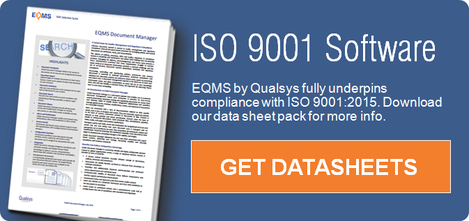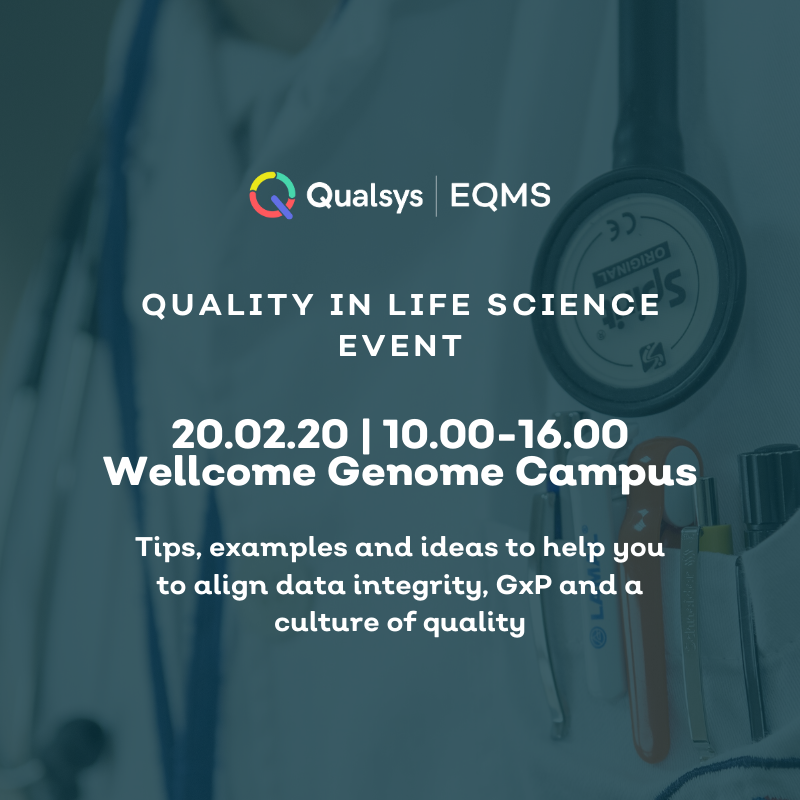Want to contribute to this article?
Qualsys recently attended the Association for Information and Image Management (AIIM) Forum in London, a one-day conference of presentations and seminars from industry thought-leaders and international organisations.

Eager to take advantage of their recent Trade Membership, Qualsys team members Alastair Atcheson and Mike Bendall travelled down from Sheffield to gain insight into the latest developments and research from the ‘Global Community of Information Professionals’.
The focus of this year’s Forum was on the transition from the ‘ECM Era’ to a new era dominated by Mobile, Analytics, Cloud and Collaborative (MACC) technologies. As organisations grow and evolve alongside developments in technology, so do industry best practices and business strategies. Accordingly, speakers and sponsors of the 2015 AIIM Forum engaged with significant emerging trends and topics that will affect organisations across a range of industries.
Over 600 delegates and sponsors came together from organisations as diverse as BAE Systems, Fujitsu, IBM, Kodak Alaris, PHS Group and Xerox for one of the UK’s most comprehensive Enterprise Content Management events.
With 20 sessions comprised of keynotes, case studies, and roundtable discussions, the Forum enabled delegates to tailor their schedules and focus on their own personal goals.
We have summarised the keynote speeches below.
Making Sense of the Information Chaos
 AIIM President John Mancini opened the Forum by tackling the focus of this year’s event: how the combined impact of consumerism, cloud / mobile and the Internet of Things is ushering in a new era of information management.
AIIM President John Mancini opened the Forum by tackling the focus of this year’s event: how the combined impact of consumerism, cloud / mobile and the Internet of Things is ushering in a new era of information management.
John asserts that what EMC (Enterprise Content Management) means in the information industry has radically changed, and that successful ECM implementation is less about technology and “more about the convergence of people and processes with technological tools”.
This change is driven by:
- New approaches to privacy and security
- Bottom up innovation supplanting top down control
- Increased government regulation of the cloud
- Ubiquitous broadband connectivity
- Growth of virtual and distributed work
- OPEX vs CAPEX procurement model
- Shortage of IT ‘connective’ and analytic skills
'The reality is that many organisations feel as if they are simply drowning in content and how they address this issue is one of the greatest challenges they will face.’
John’s advice to organisations facing this challenge is to first understand the challenge before coming to grips with it. By staying up-to-date with the latest key industry research and developments, organisations can advantageously position themselves at the head of the curve. 
The Future of Content is Cognitive
 The lunchtime keynote was delivered by Toby Bell, who leads ECM Marketing & Strategy at IBM and has over 25 years of leadership experience in technology strategy, analysis, development, and delivery.
The lunchtime keynote was delivered by Toby Bell, who leads ECM Marketing & Strategy at IBM and has over 25 years of leadership experience in technology strategy, analysis, development, and delivery.
Toby’s keynote tackled the transition to a new era of information technology and opened with an axiom that many organisations acknowledge but are perhaps reluctant to address.
‘If you don’t like change, you’ll like irrelevance even less.’
So how do you remain relevant? Organisations should focus on producing ‘smarter content’ – that is, understanding how people consume content and developing your content strategy accordingly. Toby gave three imperatives for an effective ECM strategy:
- Stay competitive through productivity and cost savings
- Protect organisation through security and compliance
- Increase growth through customer centricity
Together, these imperatives effectively state that ‘Business content is essential to enabling productivity and customer centricity – yet it must be protected’. 
'If you can't comply you can't compete.'
ECM is ultimately a set of critical capabilities that idealises interfaces between people and content. It must be compelling, easy to use, and the content must be easily accessible. An essential step towards better ECM is to clean-up Redundant, Obsolete and Trivial (ROT) content – Toby’s motto is ‘Kill them all!’
Finally, Toby turned towards IBM’s Watson, an artificially intelligent computer system capable of answering questions posed in natural language. In developing Watson, IBM recognised that people today want to self-serve when it comes to gaining information, preferring to research and make decisions on their own. Watson’s central purpose is to deliver the best and most valuable information to people to enable them to achieve this.
ECM Decisions: Mapping Out Your Forward Path
 Doug Miles is the head of the AIIM Market Intelligence Division and ‘The Doctor’ of information management, due to his expert insight, ability to diagnose problems currently facing the industry, and a striking resemblance to Peter Capaldi.
Doug Miles is the head of the AIIM Market Intelligence Division and ‘The Doctor’ of information management, due to his expert insight, ability to diagnose problems currently facing the industry, and a striking resemblance to Peter Capaldi.
Doug opened by describing himself as a ‘pragmatist, not a futurist.’ Although his presentation assessed upcoming challenges that information professionals will face, it was based on current research and filled with practical advice.
The keynote revolved around the different ‘-ations’ affecting the industry and contained some interesting statistics:
- Process optimisation – Organisations should strive to digitise content and get rid of paper, yet 35% of organisations have yet to adopt a paper-free process
- Collaboration – 84% of businesses say that IT support is important, but 19% say that internal IT support is poor
- Consumerisation – Employees are increasingly using consumer based cloud sharing software because only 23% of organisations provide an alternative
- Precipitation (Cloud) – 54% of companies are concerned about the exposure of confidential / private data, and 46% are unsure about the legal requirements for data privacy and location
- Mobilisation – Access to ECM content is important for 62% of organisations

Doug went on to discuss the current perception of information governance and the biggest risks surrounding IG. The biggest concerns include excess litigations costs, loss of valuable information and loss of customer confidence and bad publicity. For some companies this hit close to home; 14% have had a data breach in the past three years.
Fortunately, The Doctor had six practical recommendations for organisations grappling with these challenges.
- Kick paper out of the business – but it’s more about paper-free processes than the paperless office! Check out digital mailrooms.
- Assess IT support for external collaboration. Look at your current ECM system support for mobile access and hybrid cloud: how seamless?
- Take a stance on unauthorised usage of consumer file-share & sync. Don’t try to stop it without providing a commercial grade alternative.
- Move beyond records management to an Information Governance model. Use it to get rid of ROT. Safeguard sensitive content pre-GDPR.
- If your ECM / Sharepoint deployment is stalled, re-boot it: enable records and search, add some capture & BPM, and portal other content stores.
- Check out automated classification, content correction and content analytics – look to the future exploitation of your content.

What can the AIIM Forum teach Quality professionals?
While the AIIM Forum was aimed at information professionals from a wide range of industries, Quality professionals can take away some invaluable points to help improve their QMS and develop a culture of quality at their organisation:- Embrace change – The way employees work evolves alongside developments in technology. Mitigate risks raised by employees using consumer based applications such as Dropbox by providing alternatives that are easy to use and underpin compliance, such as EQMS.
- Make content compelling, relevant and easy to access – Ensure that employees are only accessing relevant, up-to-date documentation that is easy to find and edit. EQMS Document Manager automates the management of document lifecycles, keeps track of versions and utilises a user-friendly search function to ensure that your organisation has absolute control over its content.
- Embrace risk based thinking – Understand risks and challenges and endeavour to see the opportunities in them. EQMS Risk Manager saves time and money by allowing you to manage all types of risk in a single solution, opening up resources for you to enhance your risk strategy.
- Use data and analytics – Ensure that your business strategy is based on the latest analytics that your organisation pulls in. EQMS Dashboard allows you to display Key Performance Indicators and provides instant access to real-time management information.

Picture credits.
www.aiimforum.co.uk








Share your thoughts on this article